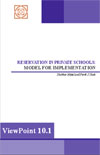| Research |
Lessons in Learning: An Analysis of Outcomes in India's Implementation of the Right to Education Act
Authors: Ayokunle Abogan, Ayaz Achakzai, Vera Bersudskaya, Sebastian Chaskel, Megan Corrarino, Emily Garin, Betsy Hoody, Chris Johnson, and Sangita Vyas under the supervision of Professor Jeffrey Hammer
Princeton University Woodrow Wilson School of Public & International Affairs
February 2013
Abstract: India's Right to Education Act (RTE), passed in 2009, declared public primary education a human right for all Indian children aged 6-14. It established standards for school infrastructure, learning materials, teacher qualifications, and student admission; instituted private school quotas for children from disadvantaged groups; and created School Management Committees (SMCs). Financing for RTE flows through the Sarva Shiksha Abhiyan (SSA), which pools resources from central and state governments to fund public and primary schools.
Using multiple datasets, this report analyzes how RTE's requirements have impacted both intermediate outcomes such as attendance of students and educators and school infrastructure, as well as the ultimate goal of student learning. It also evaluates the efficacy of current accountability mechanisms.
... read more |
| Education News |
| |
Education and India’s Jobs Crisis
- The Wall Street Journal, 14 Apr 2014
In a page-one story Monday, The Wall Street Journal reports that India’s economic slowdown is giving rural Indians fewer incentives to leave their home villages and farms in search of better-paying work. For some who have already left, it means going back to a way of life they thought they’d left behind. |
Out in Front, and Optimistic, About Online Education
- The New York Times, 13 Apr 2014
LONDON — Besides his name and email address Richard C. Levin’s new black-and-white business cards contain just two short lines of type: “Coursera” and “CEO.” Mr. Levin, the former president of Yale University, was named head of the online education company late last month. |
We aim to bridge the gap between technology and education in India
- Financial Express, 11 Apr 2014
With more and more students going online for study material, publishing industry is on the verge of a digital revolution. In this interview, Nizam Ahmed, founder & CEO, StudyeBuddy Online Services, tells FE’s Abhishek Chakraborty that setting up StudyeBuddy, an educational eBookstore, was a logical step for them. |
Sebi pitches for subject on capital markets in school syllabus
- The Times of India, 14 Apr 2014
NEW DELHI: Market regulator Sebi has made a pitch for inclusion of additional financial concepts related to capital markets in school syllabus. |
The Indian education system is broken. A few startups want to fix it
- ZD Net, 11 Apr 2014
Summary: Rote learning and abysmal teaching has led to an absence of critical thinking amongst Indian students, especially engineers. Now, a bunch of startups aims to change that. |
English Universities Losing International Students
- The New York Times, 13 April 2014
LONDON — The number of international students enrolling in English universities has dropped for the first time in nearly three decades, interrupting a long-term trend of double-digit growth. |
|
|
|
Poll
Can quality education be imparted for free?
To vote click here.
|
|
|
Video
 Milton Friedman - Educational Vouchers Milton Friedman - Educational Vouchers
Milton Friedman discusses the benefits of subsidizing the consumer versus the producer in education. Watch this video here.
|
|
Publications
 
|
| |
|
|



